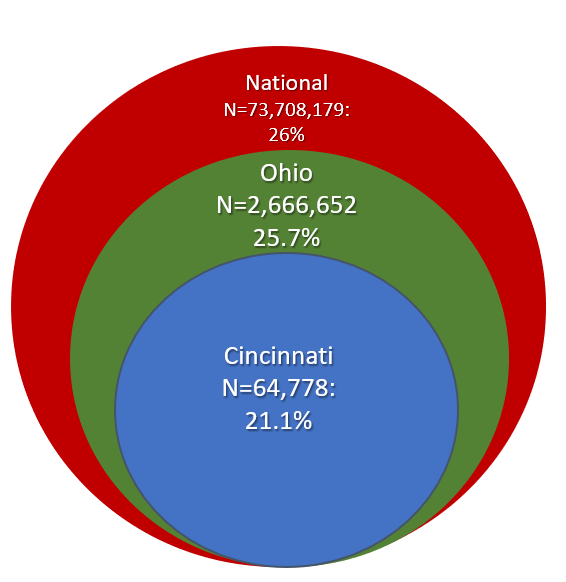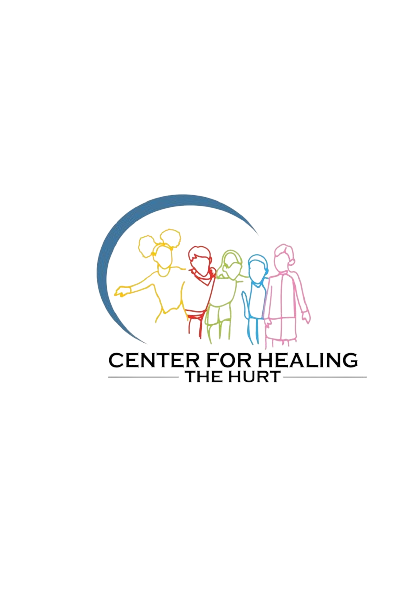
The Center For Healing The Hurt exists to assure provisions of and access to mental health services for economically disadvantaged people of color and victims of crime/trauma. Services include mental health and behavioral health counseling; Trauma-Informed Care training; community engagement; therapy and support. The goal is to strengthen the community infrastructure and capacity to address trauma and crime victimization. The Center For Healing The Hurt (CFHTH) will help the individual clients and families overcome hurt and pain for the trauma they have experienced so that the individuals and families have better mental health over their life span. The individual children will display fewer outbursts in school and at home after they have received services. The families will have higher levels of resiliency. They will develop these through the utilization of different strategies they will be taught for self-regulation. These strategies will help decrease the impact of trauma on their mental, behavioral and social development. The community will see a decrease in trauma and violence because those people who receive services from CFHTH are more likely to display less traumatic responses to adverse situations.
CFHTH has grown out of my passion for working with kids. Children are our youngest survivors of crime and trauma. Those children who live in poverty or who are in disparate populations must overcome more challenges than their peers. These children battle domestic abuse, homelessness, gun violence, death, and sexual abuse on a daily basis. Most of these children are living with chronic post-traumatic stress disorder (PTSD) cause not only by one’s life experience but the experiences of those in their family and neighborhood. My primary goal is to provide a center where these issues are addressed at an early age on a consistent basis.
Participating in a grant that did a longitudinal study of kindergarten, first and second graders, I learned about the adverse effects trauma has on small children and their families. This grant focused on assessing the trauma the children had experienced at home and in the community. It looked at their Adverse Childhood Experiences and assessed them for possible health problems, mental illness, and substance abuse in adulthood. The grant provided services to those children to help decrease the mental health issues that were to follow. The results showed that when children received proper mental health services for post-traumatic events and crisis situations, their behavioral and mental health improved greatly. The children’s behavior over the three-year longitudinal study showed that with proper mental health intervention at an early age, mental health disorders can be decreased. The trauma and pain that each child had experienced had been manifesting in their homes and school on a daily basis. The numerous services provided to each child decreased the impact of this trauma not only on the child but in their home and in the school environment.
My mission has become to transform trauma into healing and hope. My vision is to destigmatize and eradicate Mental Illness in underserved communities. The Center for Healing the Hurt will provide services, to the children, their families, and the community to lessen the impact of the adverse traumatic experiences on all that walk through our doors.
adverse childhood Experiences (aces)
Children & Youth with 2+ Adverse Childhood Experiences (ACEs)

Hamilton County, OH: 25.5%; Boone County, KY 22.7%
Nearly one-third of children in Cincinnati have 2 or more ACEs (n=20.400)
Adverse Childhood Experiences
Table 1. Local and National Level Prevalence of Adverse Childhood Items Among Children, Age 0-17 yrs.
factors
Economics
Separation
alcohol/drugs
Neighborhood Violence
Mental Illness
Domestic Violence
Imprisonment
Racism
Parent's Death
Multiple Factors
Adverse Child or Family Experiences (ACES) Items
Extreme economic hardship
Family disorder leading to divorce/separatoin
Has lived with someone who had an alcohol/drug problem
Has been a victim/witness of neighborhood violence
Has lived with someone was mentally ill/suicidal
Witnessed domestic violence in the home
Parent served time in jail
Treated or judged unfairly due to race/ethnicity
Death of a parent
Child experienced 1/more of above items
Cincinnati
30.5%
20.4%
11.8%
20.7%
10.6%
11.4%
15.4%
5.2%
7.2%
60.5%
Ohio
26.9%
22.7%
11.8%
12.4%
10.7%
8.4%
10.2%
4.0%
4.0%
50.9%
National
25.7
20.1%
10.7%
8.6%
8.6%
7.3%
6.9%
4.1%
3.1%
47.9%
About Me
The center is here to bring healing and hope to those children, adolescents, and families who have experienced trauma. The clinicians are trained in numerous areas of mental health. They focus on individual, child, family, and group therapy. They have over 30 years of combined experience. Their training includes but is not limited to crisis intervention, trauma, depression, anxiety, and anger. Dr. Thomas believes everyone can overcome trauma, receive healing and live hopeful lives.
In 2019, Dr. Thomas was honored as a People Of Color Wellness Alliance GEM and also graduated from The Cincinnati Regional Chambers Leadership Cincinnati, Class 42. She was honored as one of the YWCA’S Career Women of Achievement in 2017. She has been a Health Care Hero, selected as one of Cincinnati’s Leading Women, and an Athena Awards finalist. Dr. Thomas was honored to be in Whose Who is Black Cincinnati on numerous occasions. She is a member of Alpha Kappa Alpha Sorority, Inc. and a life member of the Ohio Counseling Association.
Dr. Thomas received her B.A., M.Ed. from the University of Toledo, where she was inducted into the University of Toledo’s Hall of Fame in 2006. She attended the University of Toledo on a full athletic scholarship and had a stellar career as a sprinter, traveling the world competing and receiving various honors, including MAC Athlete of the Year and NCAA Woman of the Year for Ohio. Her doctorate is from Kent State University.
